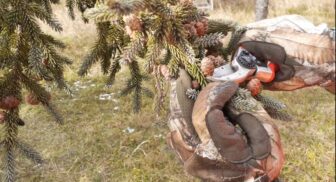
Black spruce cones in perfect condition for collection.
By Gabrielle Ahlborn
Strapped for cash? The answer could be waiting in your backyard.
In some states, the Department of Natural Resources offers an annual seed collection program. Anyone with a dry container can collect pine cones and seeds from trees and redeem them at listed nurseries for cash.
The program is available in Indiana, Michigan, Minnesota and Wisconsin. Requirements for collection vary by state and species, but all seeds must be collected from trees of natural origin, not planted.
“Feed source is really important in this type of work,” said Mike Reinikainen, the silviculture program coordinator for the Minnesota DNR. “You need to know that the seed is adapted to the local climate.”
Seeds from planted trees are less likely to survive because they are often shipped in from areas with different soil nutrients and air moisture.
The program has been available in Minnesota for over 75 years. Reinkainen said that many people collect cones and seeds as a family activity.
“You have like three generations of people that would do it,” Reinikainen said. “So you have that transfer of knowledge from one generation to the next.”

Black spruce cones pruned by a DNR official for nursery collection.
Most species are collected in the fall, but some can be harvested as early as June, such as the silver maple, or as late as January, like the green ash tree. In the 2020-2021 season, Minnesota purchased 2,460 bushels of cones and seeds across the state.
Besides being a fun outdoor activity, collectors can receive anywhere from $5 to $300 per bushel, which is a little over nine gallons of seeds.
“It’s basically a matter of how hard it is to come by,” said Roger Bohringer, manager at the Wilson nursery in Boscobel, Wisconsin. “If it’s harder to find, we pay more for it.”
The Wilson nursery is one of the many locations in Wisconsin that raises the collected cones and seeds into saplings.

The Minnesota Department of Natural Resources loads bushels of acorns and cones from the Wyman Nursery.
“Typically, we grow them for one to three years depending on the species,” Bohringer said.
Purchase prices are also affected by how in-demand the grown saplings are.
“In my last few years, black spruce has been at the top of the list,” Reinikainen said. “It’s always in demand for projects on state land and county land, so it’s been in short supply.”
Black spruce cones can be purchased for $85 a bushel in Minnesota and $200 a bushel in Wisconsin.
If you are interested in seed and cone collection, follow these DNR guidelines.
- Pick the right species. Check that the DNR species description matches what you’re picking or use a plant identification app.
- Pick off the tree. All cones and seeds must be picked directly off trees of natural origin. Fallen cones and seeds are likely not viable.
- Cones should be closed. Pine cones store their seeds within the cone, so any open cones are likely to have lost their seeds.
- Cleaning. Some species require special attention. Acorns must sink in water and black walnuts must have the husks attached. Other debris must be removed.
- Store in a cool, dry location until drop-off. Containers should be breathable to prevent molding. Bring cones and seeds to a nursery as soon as possible.
For more information on the program, visit your state’s DNR website or call a state nursery.
Minnesota DNR Seed Collection Program Information
Wisconsin DNR Seed Collection Program Information
Indiana DNR Seed Collection Program Information
Michigan DNR Seed Collection Program Information